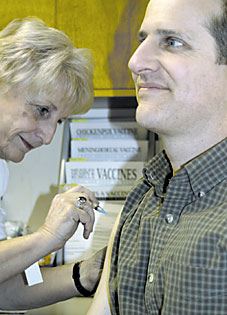 |
|
EMILY REID/Arizona Daily Wildcat
|
Roger Ceragioli, an optician at the Steward Observatory's mirror lab, grimaces as registered nurse Judy Stivers injects him with a flu immunization yesterday at the Campus Health Services Center.
|
|
By Sarah Nixon
Arizona Daily Wildcat
Friday November 8, 2002
Campus Health recommends getting a flu shot before Thanksgiving to avoid the sudden and severe onset of aches, muscle pains, chills, fever and fatigue that come with the influenza virus, which often hits during the winter holidays.
The flu is a concern for those on campus, in large classes and at crowded sporting events, said Judy Stivers, a Campus Health nurse.
The highly contagious virus leads to an average of 20,000 deaths per year, mostly among the elderly, infants and the chronically sick.
Though college students are generally not considered an at-risk group, many students travel home for family get-togethers during the holidays and airplanes are perfect mediums for the flu to spread, said Campus Health nurse Carrie Torrington.
Torrington recommends that students get flu shots to protect family and friends.
"My mom told me to come in and get the flu shot this year because I'm living in the dorms," said undecided freshman Donald Jackson.
Unlike last year when Campus Health received flu shots late in the season and experienced a shortage, there is no shortage expected for this year, Torrington said.
"We got the shots on time this year and have plenty," Torrington said.
The influenza vaccination this year will protect people, within one to two weeks of injection, from the viruses most likely to affect the United States this year, the U.S. Dept. of Health and Human Services stated.
A common myth about the flu shot is that it will give a person the flu because the vaccination is made from the virus.
"The flu shot this year cannot give anyone the viruses we are concerned with this year," Stivers said. The vaccination, that is used in the United States is derived from inactive viruses, and cannot cause the flu illness.
Flu outbreaks usually start in the Western United States around January and February, Torrington said.
People allergic to eggs or who have had serious reactions to flu shots should not receive the flu shot.

